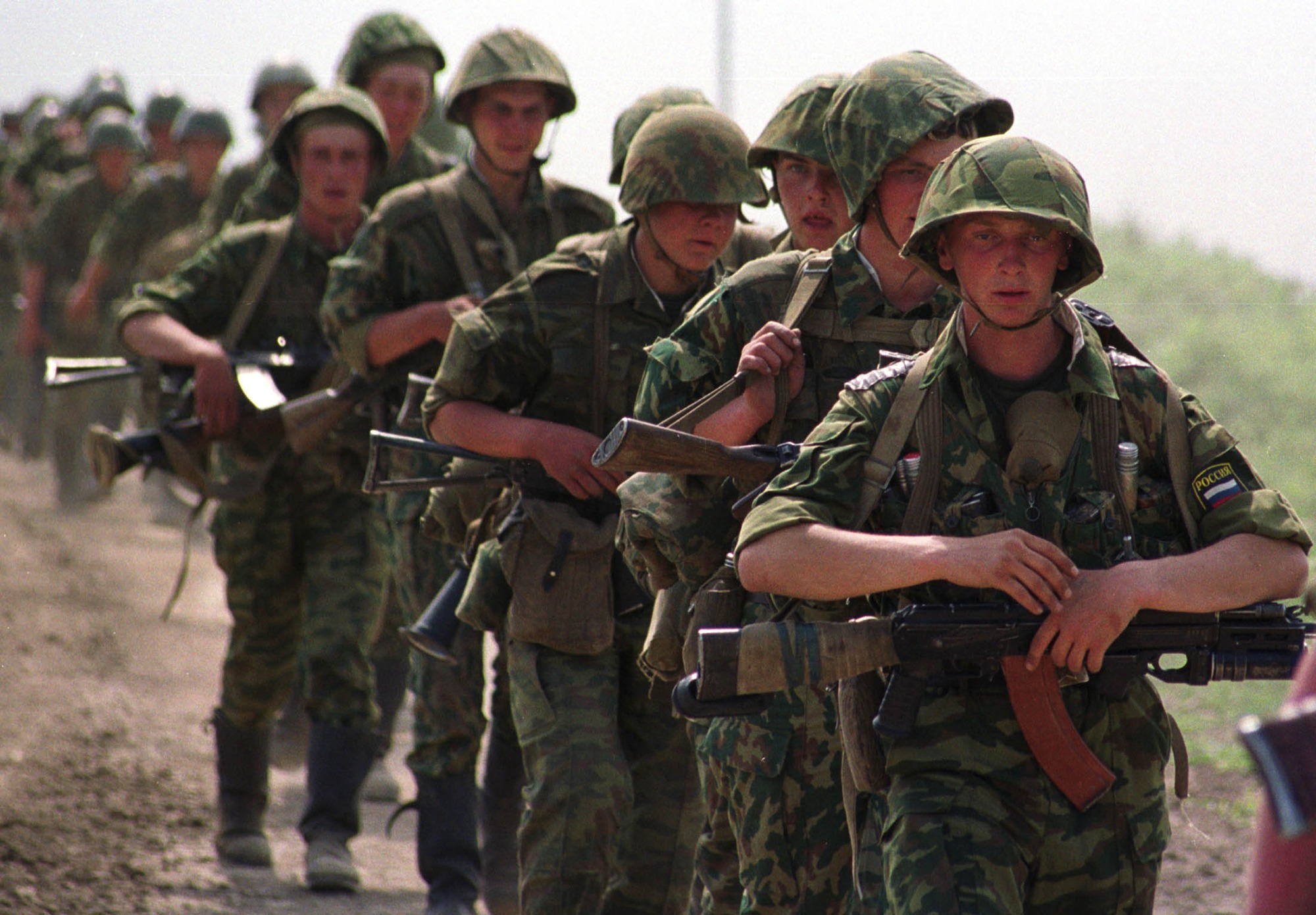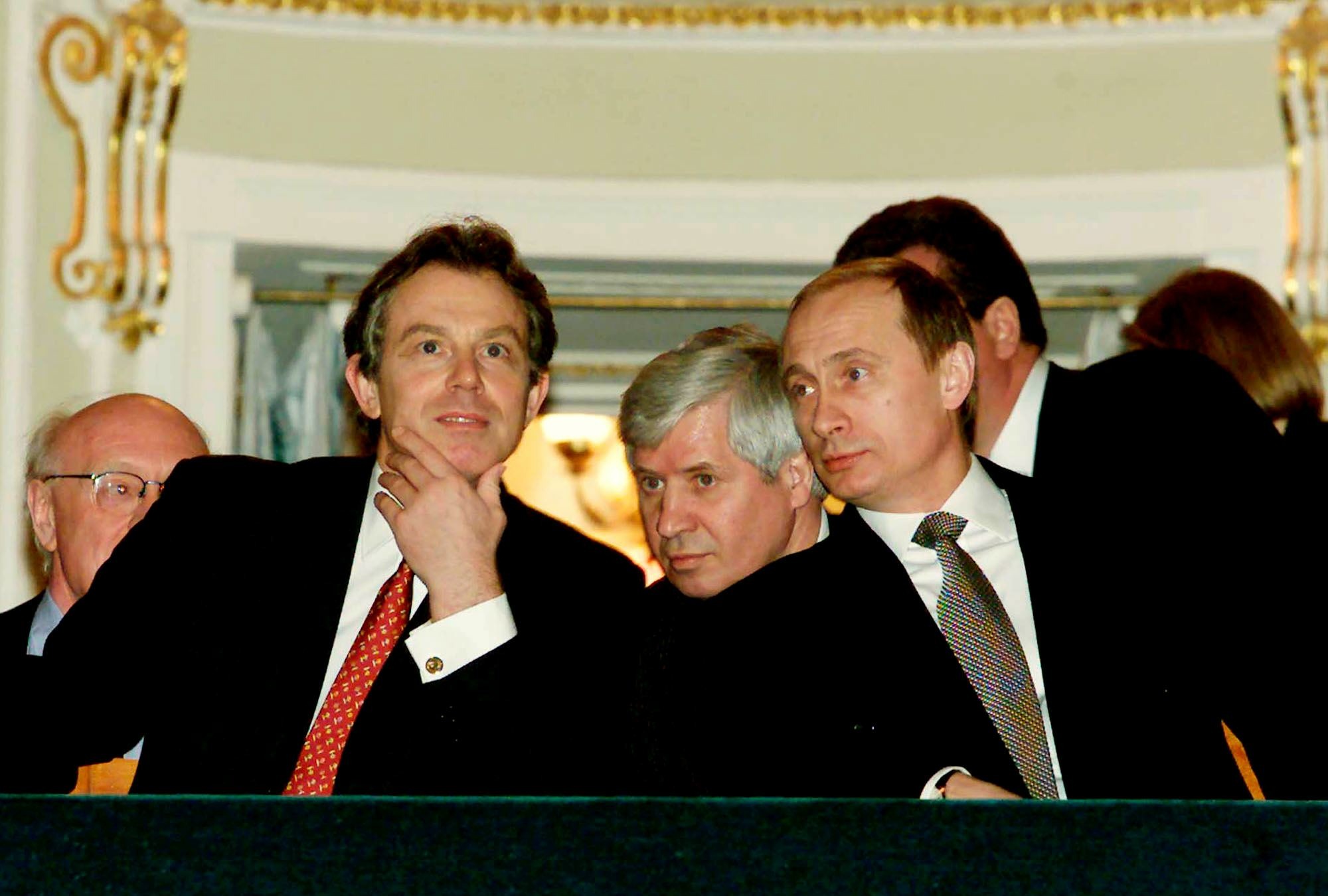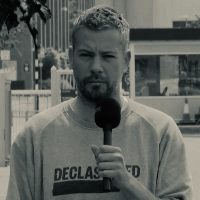- Declassified obtains Foreign Office briefing notes for Tony Blair’s March 2000 visit to St Petersburg to meet Vladimir Putin
- Blair publicly claimed at the time to be raising human rights concerns over atrocity-filled Russian military campaign in Chechnya but issue was not included in notes
- Blair briefed on expansion of British corporate interests in Russia, particularly those of oil company BP
- UK devised ‘three-year project’ to facilitate Putin’s Russia joining the World Trade Organisation while Blair wrote to world leaders urging they ‘help integration’ of Russia into global economy, notes reveal
- Blair told to ‘impress upon Putin’ that NATO enlargement ‘should not be seen as negative’
- MI6 head at time of Blair’s trip has said it was arranged to help Putin get elected in upcoming Russian presidential election
On 10 March 2000, Tony Blair flew to Russia for a whistle-stop visit, becoming the first Western leader to meet the new Russian premier Vladimir Putin in person.
A virtual unknown, Putin had suddenly become acting president two months before when Boris Yeltsin, Russia’s first democratically elected leader, resigned on New Year’s Day 2000, and appointed Putin his successor.
The timing of Blair’s visit to St Petersburg was controversial, coming two weeks before presidential elections in Russia, which Putin would go on to win. He is still Russia’s strongman 21 years later.
The Guardian noted at the time: “With only two weeks until the election… Mr Blair’s visit will inevitably be seen as support for Mr Putin.”
The Foreign Office briefing notes, obtained by Declassified after a freedom of information request, show a positive UK attitude toward Putin, believing the new president would further integrate Russia into the Western-ruled international system.
“Peter the Great was the first Russian leader to try to open the country up to the outside world,” the Foreign Office notes. “Peter founded the city of St Petersburg as a specific means to that end.” It then adds: “St Petersburgers prominent in Moscow politics today include Vladimir Putin.”
When Blair arrived at St Petersburg airport, he echoed his briefing notes. “It’s particularly appropriate that I’m here today in the city where Russia’s opening to the West began,” he said. “Where we can work together, I want our countries to work together more closely.”
The top objective of Blair’s meeting with Vladimir Putin in terms of UK-Russia relations is censored by the Foreign Office, but the notes clearly indicate Britain was pushing for closer cooperation with Russia despite its brutal war in Chechnya and Putin’s known history as a KGB officer from 1975-91.
Indeed, the Foreign Office’s second objective on the same topic was for Blair to “publicise” to Putin that the UK was trebling its funding for a scholarship scheme for Russian students, while establishing a UK-Russia Forum to bring together young Britons and Russians every year.
Chechnya
At the time of the Blair-Putin meeting, Russia was engaged in a brutal military campaign in the breakaway province of Chechnya in its North Caucasus, leading human rights groups to criticise the decision to go to St Petersburg.
“This is absolutely the wrong signal to be sending, making a private visit to the opera at a time when war crimes are being committed with impunity by Russian forces in Chechnya,” said Human Rights Watch at the time.
It added: “There are mass executions of civilians, arbitrary detention of Chechen males, systematic beatings, torture and, on occasion, rape. There is the absolutely systematic and rampant looting of Chechen homes by Russian troops; these acts need to be condemned publicly in the strongest terms.”
Blair claimed at the time that he had “always made clear our concerns over Chechnya and any question of human rights abuses there”, adding, “The way to conduct ethical foreign policy in these circumstances is to complain about abuses that occur and make sure action is taken.”
But the index of briefs for the meeting in St Petersburg does not mention Chechnya.
The only mention of the province in the 19 pages of briefing materials is in the historical section, which notes: “No one resisted the imposition of Russian rule more strongly than the Chechens, whose mountainous territory was brought into the empire only after half a century of almost continuous warfare.”
The St Petersburg talks came as Russia’s campaign in the province, known as the Second Chechen War (1999-2009), was reaching a critical stage. Much of the territory had been recaptured, but the rebels had launched a guerrilla war reminiscent of a campaign that had bogged down the Russian forces in the First Chechen War which ran from 1994-96.

Opera
In March 2000, Blair and Putin finished their meeting with a trip to the premiere of Sergei Prokofiev’s War and Peace opera at the Mariinsky Theatre in Russia’s second city.
Sir Richard Dearlove, who at the time headed MI6, Britain’s external intelligence agency, later admitted his Secret Intelligence Service had been behind Blair’s trip to the opera with Putin.
Dearlove said that in the run-up to the 2000 Russian election, he had been approached by a senior Russian intelligence officer in London asking for MI6’s help in getting Putin elected. The officer asked if Blair would be willing to attend the opera alongside Putin.
“We had a long discussion in London whether Tony Blair should accept the invitation or not, and we decided on balance that this was an unusual and unique opening and we accepted the invitation,” Dearlove said.
He added that he was “sure now there is significant regret” within MI6 about the decision to help get Putin elected.
The Russian leader is now cited by Britain’s intelligence agencies as the country’s main threat, while Dearlove’s admission is one of the clearest examples to date of the active role MI6 plays in devising UK government foreign policy.
It is possible that MI6 was minded to help Putin get elected in March 2000 due to oil company BP’s imperilled interests in Russia.
BP
The Foreign Office documents ask Blair to lobby for BP regarding the bankruptcy of the Russian oil company, Sidanco, in which BP had bought a 10% stake in 1997 for $571-million.
This “highlighted the problems faced by foreign investors”, the document notes, before the rest of the line is censored. The document then notes: “A deal was cut in December enabling BP… to hold their stake in Sidanco and begin implementation of the recovery plan to release Sidanco from bankruptcy.”
“There is still a long way to go and all will need to keep working for it,” the document adds, before concluding: “Russian government support will be vital.”
Sidanco was eventually saved and in 2002, BP increased its stake in the company to 25% for a further $375-million. In 2003, BP paid another $7-billion to Russian oil company TNK to form a 50-50 joint venture to exploit Siberia’s oil deposits.
The British Foreign Office and MI6 are closely linked to BP. Former head of MI6, Sir John Sawers, joined the company’s board the year after he left the intelligence agency and was foreign policy adviser to Blair at the time of the Putin meeting.
The UK Foreign Office declined to make any further comments on the briefing notes released to Declassified.
Restructuring
The Foreign Office makes clear in its briefing notes that Blair should promote British corporate interests in Russia. “There are over 400 British firms with offices in Moscow and a growing number in other cities throughout Russia,” it notes.
“The UK now has the fifth-largest number of joint ventures operating in Russia, many in the service sector but an increasing number are in manufacturing. There is a strong interest in telecoms.”
The briefing notes inform Blair: “The UK are [sic] designing a three-year project to facilitate Russia’s accession to [World Trade Organisation].” Russia eventually became a member of the WTO in 2012 after 18 years of negotiation.
The notes also include reference to a letter Blair had written “urging G7 colleagues to use G8 to help Russian integration into the global economy”.
The documents add that the Russian economy “has come a long way since 1991” with a “dramatic weakening of the State”. They note: “The economy has been liberalised and 70-75% of GDP (and most economic decisions) are in private hands.”
However, the notes are frank about the impact of these policies: “Output has fallen by about 40% since 1992, and at the end of 1999 the average wage was just US$58 [per month]. At least 30% of the population are below the poverty line and unemployment stands at 11.7%.”
The notes add that for “Russia to take advantage of its own long-term potential depends upon fundamental structural reform of the economy”, and that, “getting the investment climate right is key”.
NATO enlargement
In the briefing notes, Blair was also encouraged “to impress upon Putin” the “importance of a constructive Russian approach to the rebuilding of robust NATO-Russia relations” and “to emphasise that NATO enlargement should not be seen as negative for Russia’s national security”.
The point was controversial as Russia had long opposed NATO enlargement.
When the Soviet Union had been dissolved in February 1990, US Secretary of State James Baker assured Soviet leader Mikhail Gorbachev that NATO would expand “not one inch eastward”.
Yet the year previous to the Blair-Putin meeting, in 1999, three former Soviet allies — Czech Republic, Hungary and Poland — had become members of NATO.
Blair’s assurances didn’t work. By 2019, Putin said Russia is “obliged to view NATO expansion, the development of its military infrastructure close to [its] borders as one of the potential threats to our country’s security”.
Enlargement continues apace, with North Macedonia added to the military alliance last year.
Close friendship
Soon after Putin won the March 2000 elections in Russia, he made London his first foreign port of call, where he had talks with Blair and met the Queen at Buckingham Palace.
At the time, the Council of Europe, of which Britain is a member, had begun a process of suspending Russia because of its atrocities in Chechnya.
Liberal Democrat foreign affairs spokesman, Menzies Campbell, said at the time: “Mr Putin’s visit to London remains both premature and inappropriate while human rights violations continue in Chechnya.”
A Downing Street source said: “It is important to send a strong signal to Russia about our concerns over Chechnya, but the prime minister thinks the best way to get a response is through engagement, not isolation.”
It is not known if Blair did raise Chechnya during Putin’s visit because the Foreign Office claimed to Declassified that “following a search of our paper and electronic records”, it found no notes from the meeting.
By the end of 2001, Blair had met Putin nine times since he’d become Russia’s president less than two years before. Then, in June 2003, Putin was given the first British state visit for a Russian premier since 1874.
As the war in Chechnya still raged, Putin travelled through London in an open-topped carriage before a state banquet at which the Queen told the president that the two countries should remain “firm partners” despite their differences over the war in Iraq, which Russia opposed.
The Foreign Office again claimed to Declassified that it holds no notes from this state visit.
The briefing notes released to Declassified are heavily censored and were released by the Foreign Office five months after the initial request was made.
By way of explanation, the Foreign Office told Declassified: “The disclosure of information detailing aspects of our relationship with the Russian Government could potentially damage the bilateral relationship between the UK and Russia.”


